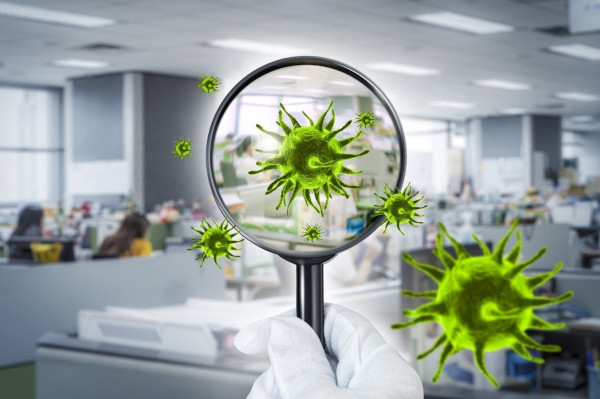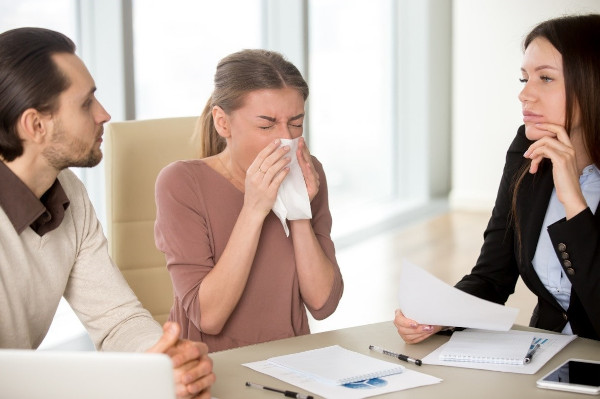Blog Post
Safety Officer Course: How to Improve Poor Workplace Air Quality

The quality of the air in your workplace will affect your employees and your business. Unfortunately, many business owners overlook the importance of the quality of the air in their workplace. When workplace air quality is poor, the air is contaminated or stale and can lead to numerous negative impacts on your employees' health as well as the success of your business. We have outlined the causes and effects of poor workplace air quality and how hiring a safety officer is the first step in improving your workplace air quality. Become a professional safety officer with EMCARE’s accredited safety officer course to ensure optimal workplace air quality for employee health and business performance.
Causes of Poor Workplace Air Quality:
Despite the numerous short-term and long-term impacts of poor workplace air quality on employees and business performance, many workplaces have substandard air quality. Poor workplace air quality is usually caused by lack of ventilation, lack of air filters or purification systems, or inadequate cleaning and maintenance of air filters and purification systems in the workplace. When there is no fresh air in the workplace, your employees are exposed to these various airborne hazards that will then start affecting their health and your business performance.
1) Particles:
Particles in your workplace air can include dust, dirt, and liquids. Some of these particles are
visible,
such as seeing a film of dust on the surface of your desk or smoke in your manufacturing area. In most
cases, the particles in the air are too small for the visible eye to see. Both large and small air
particles
are easily inhaled and will have negative impacts on employee health, such as respiratory irritation or
asthma and allergy triggering.
Particles in your workplace air are often caused by workplace activities. Even if your work activities
are
monitored and the space is well ventilated, the air quality can still be affected by particles. This is
because particles from the outside air are brought in and then become trapped in the workplace air if
there
is no air filtration system.

2) Biological Contaminants:
Workplace air quality can be impacted by biological contaminants. Biological contaminants include
microbes,
such as bacteria and viruses, mould, fungi, insect debris, pollen, animal dander, mites, and
cockroaches, as
well as their related by-products, such as endotoxins and mycotoxins. These biological contaminants can
have
various effects on employee health, such as causing infection, allergic reactions, or inflammatory or
toxic
responses.
Biological contaminants are usually exacerbated by the temperature and humidity levels of your
workplace.
Warmer temperatures and high humidity levels increase the biological contaminant levels in your
workplace
air. Additionally, biological contaminants, specifically bacteria and fungi, can accumulate in uncleaned
air
conditioners and humidifiers and then be spread throughout the workplace.

3) Chemical Pollutants:
Whether it is in the production of products or simply in the cleaning of the workplace, most workplaces
will
use some form of chemicals. Additionally, building materials, furniture, office equipment, and wall or
floor
coverings can emit chemical pollutants. These chemicals can easily become airborne as a vapor, mist, or
dust. Once airborne, these chemical pollutants can easily be inhaled by employees and have various
impacts
on employee health that ranges from mild to severe.
Chemical pollutants in workplace air are usually caused by a lack of ventilation or lack of air filters
or
purifiers. Employee activity can also increase the level of chemical pollutants in the air when
chemicals
are used or stored incorrectly. Without adequate air filtration systems and ventilation, the polluted
air
becomes trapped in the workplace and the chemical pollutant levels continue to rise.
Effects of Poor Workplace Air Quality:
An employee will spend on average 7 hours in the workplace for 5 days a week for roughly 11 months of the year. This extensive time spent in the workplace can start having severe impacts on the employee if they are consistently exposed to poor workplace air quality. We have briefly highlighted the 4 main effects of poor workplace air quality on employees and how these effects will start to impact your business.
1) Employee Health:
The most predominant effect that poor workplace air quality has on employees is impaired health. Health effects can range from mild, short-term effects to severe, long-term effects depending on the pollutant or contaminant in the workplace air. Short-term effects are usually flu-like symptoms, such as headaches, irritated nose and throat, and fatigue. Long-term effects can be the development of allergies, aggravated asthma, respiratory diseases, heart diseases, and cancer.

2) Employee Cognition:
Poor workplace air quality can affect the concentration levels, productivity, decision-making capabilities, critical thinking, and creativity of employees. These crucial cognitive abilities are essential to enabling employees to perform optimally in the workplace. The cognitive effects of employees will be differently affected depending on the cause of the pollutant in your poor workplace air quality.

3) Business Performance:
Employee health and safety are not only compulsory in workplaces, but for the performance of your business, it is beneficial to provide employees with a healthy space to work in. Employees who work in a workplace with fresh, clean air will have higher productivity levels and fewer sick days and therefore benefit the business. When employees are suffering from health impacts or impaired cognition in the workplace based on poor air quality, the performance of your business will quickly start becoming affected. Once your daily performance becomes impaired, it can affect the future success of your business.
4) Loss of Employees:
Employees who find that they are constantly sick or find that their cognitive abilities are impaired in the workplace will eventually seek employment in a workplace that values their health and safety. Your business will be impacted by the loss of skilled professionals and will have to source new employees. The effort to recruit and train new employees would be rather spent on finding solutions to improving your workplace air quality to retain your current skilled employees.
How to Improve Poor Workplace Air Quality:
The best way to improve your workplace air quality is to hire a permanent safety officer. A safety officer is responsible for the health and safety of employees and visitors to any workplace, as well as ensuring the workplace is compliant with South African regulations. A safety officer will improve workplace air quality by performing these essential roles in your workplace.
1) Risk Assessment:
A safety officer will come into your workplace and perform an initial risk assessment regarding the air quality of your workplace and identify any potential hazards. The safety officer will assess the ventilation, air filtration, and air purification systems in your workplace and will check for possible sources of chemical, particle, or biological contaminants, amongst many other assessments. This information will then be documented and produced as a report.
2) Initiate Safety Plans for Occupational Hygiene:
Based on the findings during the risk assessment, the safety officer will then devise safety plans to improve the workplace air quality and thus the health and safety of the employees. These plans will predominantly focus on occupational hygiene and proper ventilation of the space for improved air quality. Other factors the plans will cover are cleaning of the workplace and air filtration and purification systems, use of personal protective equipment, and safe use and storage of chemicals.

3) Management and Enforcement:
Safety officers will be trained to manage workplace air quality to ensure that there are no hazards to employee health and safety. A safety officer will manage all aspects of the workplace, such as operations, machines, and employee activities, to ensure that no workplace activities are impairing the workplace air quality. When necessary, a safety officer is equipped to enforce that employees and business owners follow implemented safety plans.
4) Employee Relationships and Education:
Safety officers will develop strong relationships with the employees. This relationship enables
employees to
approach safety officers with any workplace concerns. If employees are noticing symptoms or effects of
poor
workplace air quality, they will be empowered to address their concerns with the safety officer who will
then implement new safety measures to improve the workplace air quality.
The safety officer will also be in charge of educating employees on the risks of poor workplace quality.
Once employees understand the importance of workplace air quality, the safety officer will ensure that
they
understand the implemented safety plans. The safety officer will monitor that employees always act in
ways
that do not jeopardise the quality of the workplace air, and further educate the employees if they are
acting incorrectly.
5) Ensure Compliance:
The implemented safety measures, improved occupational hygiene and ventilation, and management of the workplace will all be governed by South African regulations. Your hired safety officer will be up-to-date with all South African regulations regarding every aspect of workplace health and safety. Your safety officer will therefore ensure that your workplace air quality is compliant with health and safety codes, and protect your business from fines or ceased operations if found to be non-compliant.
EMCARE Safety Officer Course:
EMCARE is a health and safety training facility that offers an accredited and reputable safety officer course. If you are looking for a professional safety officer course to become a safety officer to ensure workplace safety, our safety officer course is ideal to begin your career as a safety officer. As a business owner, if you are wanting to enrol a current employee in a safety officer course to monitor the air quality of your workplace, then the EMCARE safety officer course is the expert trainer for you.
Improved workplace air quality is one of many benefits of hiring a professional safety officer. In our safety officer course, you will learn basic safety officer principles, occupational health, risk assessment, contractor safety management, technical safety, management systems, accident incident investigation, health and safety file implementation, and how to ensure workplace compliance. These essential theoretical and practical skills can be applied to every aspect of the performance of the workplace to ensure optimal health and safety.
You can trust the quality of our safety officer course based on our accreditations. Our safety officer course is aligned with CETA and SAIOSH, among many other governing regulations. You will walk away with a reputable certificate that will validate your skills as a safety officer with the EMCARE safety officer course.
Our safety officer course is offered by expert trainers who are experienced in the field of being a safety officer. Our trainers understand the importance of having a workplace that is healthy and safe for employees, which is why they ensure that everyone who enrols in the safety officer course walks away with complete competence and confidence. Our expert trainers are available at all of our fully-equipped EMCARE branches that you can conveniently find across South Africa.
Enrol in EMCARE’s safety officer course to become professionally trained to ensure health and safety in the workplace.
GET IN TOUCH
There are a few ways to reach us below. Please feel free to contact us via phone, email or you can send us a message via the form provided and we will get back to you.




















